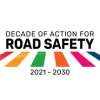Press Releases
Displaying Results 26 - 40 of 40
Zimbabwe’s road crash fatality rate increased from 1,836 in 2016 to an average of 2,000 deaths per year – over 5 deaths per day – from 2017 to 2019, according to the Traffic Safety Council of Zimbabwe (TSCZ). In reality, this figure may be over three times higher at some 7,000 road deaths per year
What moments do you live for in your daily life? We all have precious moments that we cherish. Unfortunately, every 24 seconds at least one person has those moments taken away because of a road traffic injury. In 93% of the cases, that person lives in a low- or middle-income country.
The UNRSF's
Globally, more than 1.3 million deaths and 50 million injuries are caused by road traffic crashes every year, which are the leading killer of children and young people aged 5 to 29. Over 90% of all road deaths occur in low- and middle-income countries, significantly impeding sustainable development
The World Forum for Harmonization of Vehicle Regulations (WP.29) has adopted an amendment to a United Nations Regulation on Automated Lane Keeping Systems (ALKS) that lays down the technical requirements for their use in heavy vehicles including trucks, buses and coaches. This step marks the first
Close to 100 people are reported to have died from a blast following a crash between a tanker and a truck in a busy commercial district of Freetown, Sierra Leone.
UNECE stands in solidarity with the people of Sierra Leone and is ready to support all countries to implement proven United Nations
The launch of the Decade of Action for Road Safety 2021-2030 sets the ambitious target of preventing at least 50% of road traffic deaths and injuries by 2030. To realize this vision, UNECE partnered with WHO and its sister UN Regional Commissions to develop a Global Plan for the Decade of Action,
Understanding the conditions of road crashes supports the assessment of how vehicles’ safety equipment performs, which can help to improve these systems to reinforce safety on the road. A new UN Regulation which entered into force on 30 September 2021 will introduce a major breakthrough in
Ensuring that children in Paraguay have safer ways to get to and from schools; strengthening the medical post-crash response in Bangladesh; developing streets for safer and low-carbon mobility of pedestrians and cyclists in East Africa; and strengthening road safety data management and policy
UNECE’s new Transport Statistics Infocard offers a new, user-friendly country-by-country perspective on important transport topics that are needed to inform policy decisions: road safety, numbers of cars and length of railways, alternative fuel use and public transport.
Across the UNECE region
Habtamu Zerihun is a 38-year old father to three daughters, aged 4, 6 and 12 years. Habtamu used to be a construction worker in and around Addis Ababa, until he was hit by a pickup on his walk to work. The pickup driver was under the influence of stimulant drugs and there were no adequate
As one of the most sustainable, inclusive, safe, and healthy forms of mobility, cycling received a major boost today with the adoption of the first-ever Pan-European Master Plan for Cycling Promotion at the Fifth High-Level Meeting on Transport, Health and Environment (THE PEP). The Master Plan is
Speed kills. A child hit by a car at 30 km/h (20 mph) can survive. Hit at 80 km/h (50 mph), most will die. “Streets for Life” is the slogan chosen for the 6th United Nations Global Road Safety Week (UNGRSW) to be launched this 17 May 2021, calling for 30 km/h (20 mph) speed limits to be the norm
As the world enters in a new Decade of Action for Road Safety 2021-2030, the UN Road Safety Fund (UNRSF) announces the successful completion of two of pilot projects demonstrating the potential of targeted and coordinated action to save lives in low- and middle-income countries, where 90% of the 1.
According to national statistics, road traffic deaths in Ethiopia more than doubled between 2007 and 2018, rising from 2,161 to 4,597. Ethiopia loses 13 people per day, or one person every two hours, to road traffic crashes. Given the magnitude of the road safety challenge, which constitutes a
Some 40 Countries have agreed on a draft United Nations Regulation for Advanced Emergency Braking Systems (AEBS) for cars. This will significantly improve road safety, especially in cities, where in the European Union alone, over 9,500 fatalities were recorded in 2016, accounting for 38% of all














